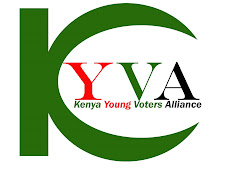KYVA is a conglomerate of organizations and individuals committed to ensuring that Kenya as a country manages to achieve set developmental goals to meet both the international and national targets. The idea was mooted by the (SONU) leadership of 2003/4. KYVA leadership is composed of diverse backgrounds and experiences. We urge all Kenyan youths to take charge of leadership at the counties and national levels. Register as voters and vote in large numbers for young visionary leaders.
Sunday, January 17, 2010
TEACHERS ALONE CANNOT SOLVE SOCIETY`S ILLS.
Dear Sir/Madam,
There is little doubt that most public schools are failing the poor. They are producing exam results that we ought to be ashamed of. Consequently, society has unflinchingly blamed teachers in entirety for the long tail of underperformance. But is the society really justified in lambasting the teaching fraternity?
I personally believe that such a stinging indictment is rash considering the fact that the dramatic social and economic changes that have taken place in the last decade or so have had a great influence on schooling in Kenya. More and more Kenyan families have slid into grinding poverty. Such changes have profoundly affected the context in which schools are expected to "meet standards". Many teachers in public primary day schools attest to the fact that pupils do not do their homework because there isn`t electricity nor fuel for lighting homes. It would therefore be naïve to wish away the strong correlation between the millions of children living in abject poverty and the nose-diving academic performance especially in public primary schools.
In the same vein, because of the hustle and bustle of life, very few parents ever have quality time with their children. It is even worse when such a family has no one with any meaningful work experience. In the absence of any role model in the family, parenting is almost entirely left to ill equipped teachers who have increasingly found themselves unable to cope with the rising psychological and physiological needs of students. Sadly, society has always imagined that teachers alone can overcome "social, cultural pressures and aspirational gaps” its children are faced with. It would be fallacious for society to expect teachers to play the entire cast. Society must therefore take a bigger share of the blame in the "long tail of underperformance".
Ironically, the Government too has been seen pointing an accusing finger at its teachers. Yet it has played very little if any in addressing these dramatic changes. It has simply buried its head in the sand and believed that somehow public primary education will find its own footing. What is even more disheartening is to see the dalliance between Government and the private affluent. The Government has been seen idolizing private affluence by openly ignoring the public`s demand for quota based system of admission to the best secondary schools in the country. This has unfortunately resulted in the majority of students from private academies securing a huge chunk of the limited admissions in the leading secondary schools in Kenya.
To justify this stinking inequality, the private affluent have gone to a great extent of hiring academic gurus to come up with glistening discourses that laud the yawning socio –economic gaps between public and private schools. We have heard them opine that given the necessary push (in our context, FPE) socio-economic status does not affect the academic performance of a child!
In my view, this is akin to taking up some cast-off item and imbuing it with unsuspected beauty and mystery. The effect of such colorful discourses is to condemn the victim`s malnourishment on the victim`s feeding habits and to ensure that no attention at all is given to the nutritive value of the morsel given to the victim. The same trend is replicated in secondary schools and the universities where competitive courses are taken by the children of the rich.
Yet this is not surprising at all. Ab initio; attempts at social mobility have been discarded and the poor condemned to perpetual poverty. This is what Free Primary Education (FPE) is doing in its current state. In fact, its euphemism is “Failed Public Education”.
From the foregoing, it is abundantly clear that the aims of education cannot be achieved by teachers alone. It would be more profitable for the society to give attention to how resource allocation and partnerships might be achieved in order to better the academic performance of children in public schools, rather than expecting teachers to compensate for society`s failures.
TOME FRANCIS,
BUMULA CONSTITUENCY.
http://twitter.com/tomefrancis
Subscribe to:
Comments (Atom)
